By Sim Kwang Yang
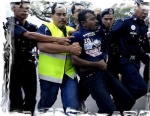 When you are stopped by a policeman by the roadside, or called in for questioning, or arrested for some alleged crimes, do you know all the basic rights? Or are you so scared you just let him do what he wants to do with you?
When you are stopped by a policeman by the roadside, or called in for questioning, or arrested for some alleged crimes, do you know all the basic rights? Or are you so scared you just let him do what he wants to do with you?
Remember that time when Wong Chin Fatt was detained at the brickfields police station for wearing black T shirt or some silly charge like that? About 20 people went to the police station and held a candle light vigil to give him moral support outside the fencing.
The policemen in the station got excited and rushed out to arrest them. Five lawyers went to the police station to offer their legal counsel and they too were arrested.
My friend Mr. LTC was among those arrested. Later he told me what happened inside the police station.
“We were gathered outside in the yard, and tables were set up for our interrogation. I was interviewed by a young officer who looked like a Chinese but spoke very good Bahasa Malaysia. He was very polite to me throughout the interview, probably because I too spoke good BM.
“After my preliminary details were taken, his first question was to ask me who my father was. I was baffled. I told him my father tidak kena-mengena (is not relevant) to my presence there, and I refused to answer his question.
“Then he asked me what my profession was, and I told him I was jobless. (Mr. LTC is a successful businessman.)
“Then he asked me why I was lighting candles there, and so I told him I wanted to express solidarity with Wong Chin Fatt.
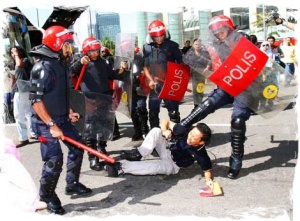
“I was not the slightest bit intimidated by him, because I had done no wrong. After a short while, this policeman handed me a statement for me to sign. I read through the form and discovered a paragraph that said that I did not have to answer his questions. I scolded him for not cautioning me, and asked him what would happen if I did not sign the statement. He said nothing, and so I did not sign. After a couple of hours, we were all released.”
Even if Mr. LTC does not know all the laws, he is educated enough to do all the right things.
Then I received in my email a piece entitled Police and your basic rights by some anonymous author, probably from the Malaysian Bar Council.
I would advise you all to go through the long and boring piece. You may need the knowledge one day.
Police and your basic rights
1. POLICE STOP YOU
1.1 Not in uniform, ask for identification
Say: “Please, show me your Police authority card”.
1.2 Police authority card
Red colour: Suspended Police Officer. He has no authority to do anything to you. Walk away.
Other colours:
• Blue colour: Rank of inspector and above
• Yellow colour: Below the rank of inspector
• White colour: Police reserve
Note his name and ID number
1.3 In uniform
Note his name and ID number on his uniform
1.4 Police vehicle
Note the number plate of the patrol car or motorcycle.
2. POLICE QUESTION YOU WHEN STOPPED
Only give your name, ID card number and address.
2.2 The Police ask other questions
Politely ask “Am I under arrest?”
2.3 When are you under arrest
You are arrested if the Police: tell you “yes”;
• do not allow you to leave/want to take you to the Police station; or
• handcuff you.
If you are not under arrest, you may walk away/refuse to follow him back to the Police station or anywhere else, if asked.
2.4 When you cannot be arrested
The Police cannot arrest you just because you are a potential witness and want to take a statement from you
(112/Witness Statement).
3. QUESTIONING BY POLICE WITHOUT ARREST
3.1 112/Witness Statement
When the Police are investigating a case and think you have information/knowledge about the case, the Police may examine
you and take down your answers (112/Witness Statement).
3.2 Informal/ Formal Request
Most 4times, the Police make an informal request that you give a 112/Witness Statement. If the place and time is convenient to you, cooperate. If not, tell the Police you will do so at a convenient place and time.
If you completely refuse to cooperate, the Police can issue a formal order in writing signed by an investigating officer (Police Order) to ask you to cooperate.
If you disobey a Police Order, you cannot be arrested. However, it is an offence and the Police may request the Magistrate to issue a warrant against you to compel you to cooperate.
3.3 Giving a 112/ Witness Statement
You have the right to ask a lawyer to accompany you. This is advisable. In giving a 112/ Witness Statement, you may refuse to answer any question / remain silent if the answer is likely to expose you to a criminal offence.
• Bring along a notebook or writing paper with you (Personal Notes).
• Write down every question asked in your Personal Notes.
• Make sure you understand every question asked.
• Take your time and think carefully before writing answers in your Personal Notes.
• Read your answers to the Police Officer questioning you.
• Keep your Personal Notes for future reference.
3.4 Signing your 112/Witness Statement
Before signing your statement, read the questions and your answers written by the Police Officer carefully.
• Compare the statement you are asked to sign with your Personal Notes.
• You have the right to make any corrections/changes to the statement before signing.
• Sign your signature immediately below the last sentence of your statement.
4 POLICE ARREST YOU
4.1 Ask: “Why am I under arrest?”
An arrest is unlawful if you are not informed of the reason.
4.2 Do not resist an arrest
The Police have the right to use reasonable force to arrest you if you resist.
4.3 Ask: “Which Police station are you taking me to?”
The arresting Police Officer must immediately take you to the nearest Police station and no other place.
4.4 What to do when arrested
You have the right to make a telephone call.
Call your family or friend or lawyer or the Legal Aid Centre (LAC).
Inform:
• you have been arrested;
• the time, place and reason of the arrest;
• the identity of the Police Officer; and
• the Police station you will be taken to.
4.5 What happens after arrest
You may be detained up to 24 hours:
• at the Police station, or
• in a lock-up to “assist” Police investigation.
5 YOUR RIGHTS AFTER ARREST & DURING DETENTION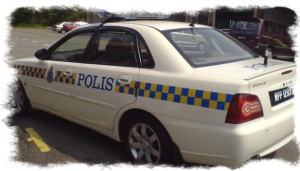
5.1 Right to contact lawyer
You have the right and should insist to contact/see your lawyer.
5.2 Clothing
You are allowed to have one set of clothing on you in the lock-up.
5.3 Personal belongings
The Police must record and put all your personal belongings in safe custody.
Your personal belongings must be returned to you upon your release.
5.4 Welfare
You are allowed to take bath two times a day.
If you are sick, you have the right to receive immediate medical attention.
You are to be given proper and adequate food and water during detention.
5.5 How long can the Police detain you
The Police can only detain you up to 24 hours for investigation.
The duty of the Police is to complete investigation within 24 hours and to release you as soon as possible.
If the Police cannot complete investigation within 24 hours, the Police must bring you before a
Magistrate for a remand order to extend your detention beyond 24 hours (“Remand Order”).
6 REMAND ORDER BY MAGISTRATE AFTER ARREST
6.1 Who is a Magistrate
A Magistrate is a judicial officer. He/She has power to make a Remand Order to detain you for more than 24 hours.
6.2 Purpose of a Remand Order
It is to give more time to the Police to complete their investigation and decide whether there is evidence to charge you for an offence.
The Police cannot ask for a Remand Order only for the purpose of taking a statement from you.
6.3 How long is a Remand Order
When the Police bring you before a Magistrate for a Remand Order, the Police must give reasons to the Magistrate why it is necessary to detain you beyond 24 hours. The Magistrate’s duty is to consider carefully the reasons given by the Police.
The Police will usually ask for a further detention of 14 days or less.
The Magistrate, after careful consideration of the reasons given by the Police, has discretion:
• not to make a Remand Order; or
• make a Remand Order for a period shorter than that asked by the Police.
The Police can make more than one application for a Remand Order. Altogether, you cannot be detained longer than 15 days.
6.4 What to say when you are brought before a Magistrate for remand
Tell the Magistrate:
• you want legal representation and to contact the LAC and your family;
• you want medical treatment because you are sick or have been beaten;
• if the Police had threatened or beaten you during your detention;
• if you had been denied proper food/water/clothing, toilet or necessary medical attention during your detention;
• whether the Police had carried out any investigation during your detention.
6.5 Ask for a shorter Remand Order from the Magistrate
Before the Magistrate makes the Remand Order, ask for a shorter remand period asked by the Police. Give reasons (Example: “I will co-operate with the Police in their investigation”, “I will be available” etc).
7 BODY SEARCH WITHOUT ARREST
7.1 When can this be done
If you are at a place (example: karaoke/clubs/entertainment outlets) where the Police are conducting a raid or looking for something (example: drugs), the Police may search your body/bags without arresting you.
This must be done in the presence of a Police Officer who is an inspector or of a higher rank.
7.2 What to do
• Do not allow the Police Officer to put his hands into your pockets or bags.
• Volunteer to empty your pockets/bags in his presence so you can see all your belongings.
• Take out your belongings one by one. Each time, say “Purse”, “keys”, “ID card”, etc.
• When your pockets/bags are empty, turn your pockets/bags inside out.
7.3 Your rights
• A female can only be body searched by a female Police Officer.
• All body searches must be carried out with decency (Example: cannot touch your private parts).
• There is no law requiring you to strip naked.
8 BODY SEARCH UPON ARREST
8.1 When Police can do so
• The Police have power to search your body for any object relating to the suspected offence.
• The body search must be conducted in a confined place. It is your right to be bodily searched in private.
8.2 Strip search
Even when arrested, there is no law allowing the Police to force you to strip naked.
If you are forced to strip naked/ threatened if you do not strip naked:
• Protest.
• Remember the Police Officer’s name.
• Lodge a report after the incident.
9 QUESTIONING BY POLICE AFTER ARREST
9.1 Identity of the Police Officer questioning you
Note the name/rank of the Police Officer questioning you.
9.2 Right to remain silent
The Police Officer will first make friendly conversation/talk (example: ask you about your family and friends etc). Be polite. Do not be afraid to remain silent. This is your right.
9.3 Police want a written statement (113 Statement) from you
The Police Officer will ask you questions and then write down your answers. You are only obliged to give your full name, age, address and occupation (Personal Particulars).
Other than giving your Personal Particulars, you have the right to remain silent.
If you choose the right to remain silent, say: “I will answer in Court”.
9.4 Police cannot force you to make a 113 Statement
After giving your Personal Particulars, and the Police Officer wants you to say more things by threatening or forcing you into making a written statement:
• stay calm and remain silent;
• the Police Officer has no right to threaten, beat or force you into making a written statement.
If you have been threatened, beaten or forced, lodge a police report against the Police Officer at first opportunity. This is your right.
9.5 If you wish to give a 113 Statement
Follow the steps in paragraphs 3.3 and 3.4 above.
If you do not have a notebook/writing paper, request from the Police Officer.
Your 113 Statement can/will be used as evidence against you in Court to prove:
• you have admitted / confessed to the criminal offence as charged; or
• you have admitted / confessed certain facts that tend to show you are guilty of the offence as charged.
🙂
Downloadable PDF Format on Police and your basic rights
🙂
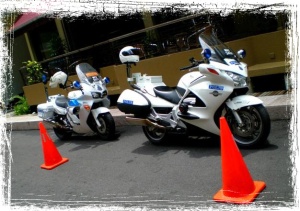


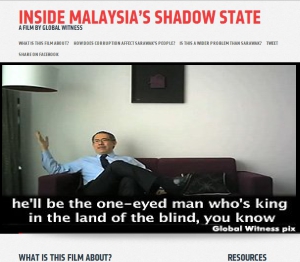



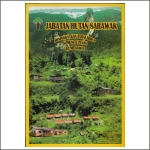















thanks for the info!!!
Comment by may88_98 — October 14, 2009 @ 10:03 AM |
thank you for this information. I hope u ll go on helping us to learn this kind of important issues
Comment by akincitr — August 28, 2009 @ 1:28 AM |
I feel so proud that this REDBOOK received such awesome responses. I got it from my ex-teacher. If SKY received an updated copy, pls post it on this site.
I’ll bring this REDBBOK along for tomorrow event. “MANSUHKAN ISA” march to palace.
Comment by Yen — July 31, 2009 @ 9:10 AM |
This is an excellent piece.
People should know what specifically constitutes “arrest.” You don’t have to be handcuffed to be under arrest. If the police have temporarily deprived you of your right to mobility, you are under arrest in Constitutional terms.
You should also familiarize yourself with the exceptions to the warrant requirement. I.e. if you are in a car that is readily mobile, police do not need a warrant to search you (and there are many others, look them up).
Comment by reslibertatis — July 30, 2009 @ 10:38 PM |
[…] across this blog and i wanted to share this articles with everyone since latter there are plenty of rempit disgusting […]
Pingback by onelikming’s mansion » Your rights and Police. — July 30, 2009 @ 8:17 PM |
[…] On a separate note, also take note of your basic civilian rights when being approached by the police. […]
Pingback by Self-protection « Pencil Paper Push Shutter — July 30, 2009 @ 6:53 PM |
This like a wild dream. Just asking for the police i/d can lend you in the lock up with a swollen face. Coem one Sim, what are these rules in a lawless state where police have the licence to kill?
Comment by Sam01 — July 30, 2009 @ 4:06 PM |
That kind of hurried retort (as the bad spelling suggests) is a little simplistic and nihilistic, don’t you think? What is your solution then?
At least I appreciate the effort of the Bar Council in educating the public on the law and try to help them spread their message. I don’t deserve this kind of hurried knee jerk retorts!
Comment by sky — July 30, 2009 @ 6:58 PM |
SKY, l sincerely hope that you don’t let Sam01, just 01 distracts u from your humble but much needed effort. There will be plenty of Sam01, just that, 01 but know that for every 01, you got 100 and that is what keeps us going.
01 comes and go, because person like 01 is a dying breed, for they run in the first instant they can. THE world is so much distinguishable and better when we get someone like 01.
Apang
Comment by Apang — July 31, 2009 @ 1:24 AM |
When you go police station and want to make statements, it seems that all the staff at the counters are looking at their computer screen. Very busy konon ?? But you know what is on the screen ? Computer games !
When it comes to the rakyat asking for the presence of the police on the streets , etc , they say ” We tak cukup orang la ….rakyat kena faham la …. we banyak kes”.
But staff at service – counters that day , both of them are playing games ! Both of them …policewomen!
What SAY YOU ?
Comment by Jasmine — July 30, 2009 @ 2:53 PM |
If you are driving and you are flagged to stop by anybody who is not in uniform, you do NOT have to stop. This is the law. Just remember that!
Comment by KB — July 30, 2009 @ 1:38 PM |
Do you think police will give a damm abt this SOP. Hello Kawan, keep dreaming. Country with laws for certain group of people only..If u resist, they will bashing you in any circumstances. If u complain to magistrate, u will get it when they put u back to lock-up. I was there, been there, done that…They will treat u well if they know if u hv $$$$. Other than that…mmmm sendri mau ingat!!
Comment by Zahid — July 30, 2009 @ 1:05 PM |
MR.Sim
Thanks for your guide lines.
Malaysia ia a police state and the Malaysian police is a licensed terrorist official organization meant for protecting nazi organization of UMNO which run this country as they like.To be safe, better avoid malaysian police at all or change the goverment in GE so that this terrorist institution of Malaysian police can be reformed by a new goverment and of cause it has to be from Rakyat that is PAKATAN RAKYAT.
Comment by Pro-dharma — July 30, 2009 @ 10:59 AM |
Anyone know what is the phone number for the Legal Aid Centre (LAC)?
Comment by Eric — July 30, 2009 @ 10:58 AM |
its a very good piece of legal information and i hope this info can be circulated to all PR. sadly, with recent MACC and police bad images, many of us believe we are heading to police state and anything can happen to anyone.
Comment by xpose — July 30, 2009 @ 10:47 AM |
A friend of mine was detained for 2 days for having at the time a set of car keys(his) which a piece was so worn out(old car,old keys) it was suspected to be a master key capable of accessing other vehicles.He was locked-up together with other hardcore criminals.so anyone having set of worn-out keys to regularly tag along, get it new so as not to be suspected as a car thief or other ‘masterkey’ crimes.
Comment by tomdickharry — July 30, 2009 @ 10:26 AM |
Print a copy, put it in your bag and do an AMEX: Don’t leave home without it!
You will never know when you’ll need it but more importantly, the police will quickly back off once you start reeling off questions!
Good job SKY, as always.
Comment by Taikohtai — July 30, 2009 @ 9:47 AM |
Keep dreaming.. Read my comment
Comment by Zahid — July 30, 2009 @ 1:08 PM |
[…] Sim Kwang Yang a.k.a. Hornbill Unleashed came out with a good write-up on “Police And Your Rights”. It is reporoduced here for those who may not have read it…. https://hornbillunleashed.wordpress.com/2009/07/30/2940/ […]
Pingback by Police And Your Rights | lucifer-butler — July 30, 2009 @ 9:40 AM |
Do the police even care to entertain such basic human rights? Those rights have been violated many many time …thousands of police reports have been lodged… tapi apa guna! sama saja….TIADA TINDAKAN BAH!
Comment by ratormo — July 30, 2009 @ 9:11 AM |
It is Wong CHIN HUAT.
Comment by Eric — July 30, 2009 @ 9:07 AM |
Theorical advice. If I dont cooperate, I may be whacked. What is the use of being rightbut dead.
Comment by madman — July 30, 2009 @ 8:58 AM |
Print it out and post it on the fridge!
Comment by 'Nother Fellow — July 30, 2009 @ 8:49 AM |
One of our readers have commented on rights to legal representation earlier, fitting to reiterate herein:
The Criminal Procedure Code (CPC) has been amended to provide safeguards for a detained person’s right of access to a legal practitioner of his/her choice. The exercise of this right may only be denied by a police officer above the rank of a Deputy Superintendent of Police under exceptional circumstances.
Our advice is, insist on your rights to consult a lawyer of your own choice when you are being detained. If your demand is denied by the police officer, write down his name, rank and his answers and explanation why your constitutional rights to legal representation is denied.
The “Red Book” produced by the Malaysian Bar has been a most useful guide. However, it was produced a few years back and we will write to them for a republication to incorporate the later amendments.
Comment by Chee How — July 30, 2009 @ 8:40 AM |
Thank you, Mr Sim.
We are dangerously down the road to a kleptocratic, failed, police state.
Comment by Phua Kai Lit — July 30, 2009 @ 8:13 AM |
The downloadable PDF fromat goes to the comment box.
Comment by Patriot — July 30, 2009 @ 7:51 AM |
Sorry for the error, it should be ok now. please follow the link.
Comment by hornbillunleashed — July 30, 2009 @ 9:26 AM |